反意疑问句专题
反义疑问句(最全)
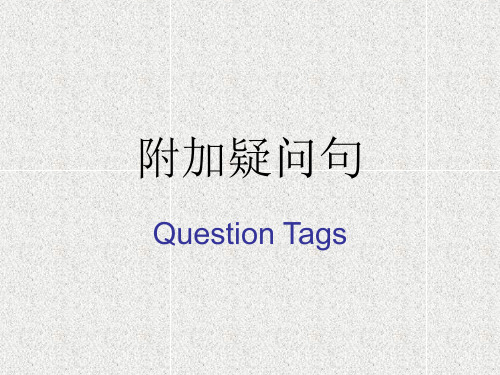
5.陈述部分有would rather +v.,疑问部分多用 wouldn’t +主语。 He would rather read it ten times than recite it, wouldn’t he? 6.陈述部分有you’d like to +v. 疑问部分用wouldn’t + 主语。 You’d like to go with me, wouldn’t you? 7.陈述部分是“there be”结构时,疑问部分用there省 略主语代词。 There is something wrong with your watch, isn't there? There will not be any trouble, will there? Note: 当为“ there used to be…”句型时,反意问句用 didn’t there。
b. 带有定语从句,宾语从句的主从复合句,疑问部分谓 语根据主句的谓语而定 He is not the man who gave us a talk, is he? He said he wanted to visit Japan, didn’t he?
c. 上述部分主句是由谓语think, believe, expect, suppose, imagine等引导的宾语从句,疑问部分与宾语 从句相对应构成反意疑问句 I don't think he is bright, is he? We believe she can do it better, can't she? Note: 但此时主语必须是第一人称。如果不是,则不能否定从 句。 He thought she was wrong, didn't he? 而不能说wasn't she?
反义疑问句例句20个
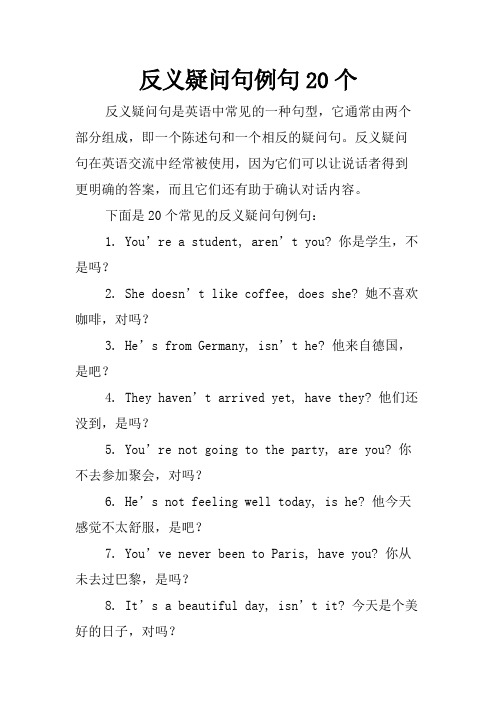
反义疑问句例句20个反义疑问句是英语中常见的一种句型,它通常由两个部分组成,即一个陈述句和一个相反的疑问句。
反义疑问句在英语交流中经常被使用,因为它们可以让说话者得到更明确的答案,而且它们还有助于确认对话内容。
下面是20个常见的反义疑问句例句:1. You’re a student, aren’t you? 你是学生,不是吗?2. She doesn’t like coffee, does she? 她不喜欢咖啡,对吗?3. He’s from Germany, isn’t he? 他来自德国,是吧?4. They haven’t arrived yet, have they? 他们还没到,是吗?5. You’re not going to the party, are you? 你不去参加聚会,对吗?6. He’s not feeling well today, is he? 他今天感觉不太舒服,是吧?7. You’ve never been to Paris, have you? 你从未去过巴黎,是吗?8. It’s a beautiful day, isn’t it? 今天是个美好的日子,对吗?9. He can’t swim, can he? 他不会游泳,对吗?10. She doesn’t like pizza, does she? 她不喜欢披萨,对吗?11. You’re not afraid of heights, are you? 你不怕高,对吗?12. They won’t be able to attend the meeting, will they? 他们不能参加会议,对吗?13. They’re leaving tomorrow, aren’t they? 他们明天要走了,对吗?14. He’s never been skiing, has he? 他从未滑过雪,对吗?15. She’s not going to the concert, is she? 她不去音乐会,对吗?16. You’re not worried about the exam, are you? 你不担心考试吧,对吗?17. He didn’t eat breakfast this morning, did he? 他今天早上没吃早餐,对吗?18. They’r e not going to the beach, are they? 他们不去海边,对吗?19. You’ve already seen the movie, haven’t you? 你已经看过这部电影了,对吗?20. He’s not coming to the party, is he? 他不来参加聚会,对吗?在使用反义疑问句时,需要注意的是,它们并不总是表示对话者的不确定或疑虑。
语法之反意疑问句专题

Someone has taken the seat, ? Everyone has done their best in the game,
?
10. There(Here) + be + 主语,v. + there(here)?
There are two cakes on the plate, Here is a story about her, ? There are two bananas on the plate, A. aren’t there B. are there C. are they D. aren’t they
?
practice
1、His sister had a bad cough, ______she? A. wasn’t B. doesn’t C. hadn’t D. didn’t 2、Mr. Green went to Shenzhen on business last week,________? A. isn’t he B. doesn’t he C. didn’t he D. hasn’t he
?
3.Let us 祈使句,will you?
Eg:Let us go swimming, ?
例: Let us do homework, __________? A. will you B. shall we C. don’t you D. are you
4. 陈述部分如果有表示否定意义的词: never,seldom,hardly, few, little, nobody, no one, nothing, neither…,疑问部分用肯定式。
?
12. 主语 + used to…,didn’t/ usedn’t + 主语?
初三英语反意疑问句考点专题训练
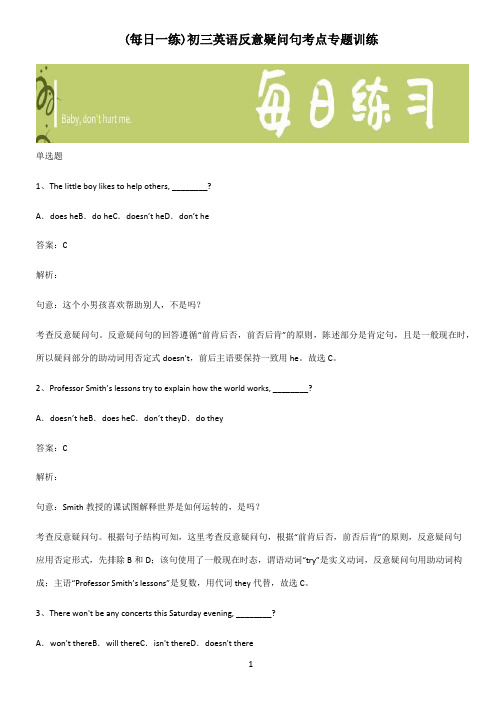
(每日一练)初三英语反意疑问句考点专题训练单选题1、The little boy likes to help others, ________?A.does heB.do heC.doesn’t heD.don’t he答案:C解析:句意:这个小男孩喜欢帮助别人,不是吗?考查反意疑问句。
反意疑问句的回答遵循“前肯后否,前否后肯”的原则,陈述部分是肯定句,且是一般现在时,所以疑问部分的助动词用否定式doesn't,前后主语要保持一致用he。
故选C。
2、Professor Smith’s lessons try to explain how the world works, ________?A.doesn’t heB.does heC.don’t theyD.do they答案:C解析:句意:Smith教授的课试图解释世界是如何运转的,是吗?考查反意疑问句。
根据句子结构可知,这里考查反意疑问句,根据“前肯后否,前否后肯”的原则,反意疑问句应用否定形式,先排除B和D;该句使用了一般现在时态,谓语动词“try”是实义动词,反意疑问句用助动词构成;主语“Professor Smith’s lessons”是复数,用代词they代替,故选C。
3、There won't be any concerts this Saturday evening, ________?A.won't thereB.will thereC.isn't thereD.doesn't there解析:句意:星期六晚上没有音乐会,是吗?考查反意疑问句。
反意疑问句遵循“前肯后否”、“前否后肯”的原则。
分析句子可知,“There won't be any concerts this Saturday evening”表示否定意义,所以反意部分应为肯定形式;又因为句子时态为一般将来时。
故选B。
初、高中反义疑问句全解(含测试题)
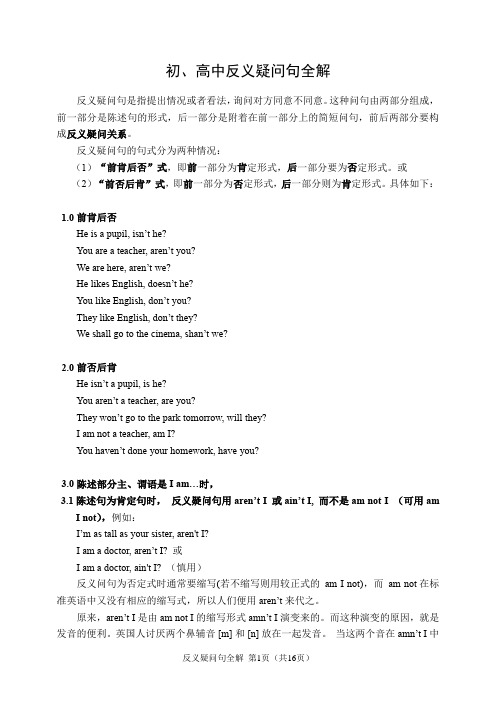
初、高中反义疑问句全解反义疑问句是指提出情况或者看法,询问对方同意不同意。
这种问句由两部分组成,前一部分是陈述句的形式,后一部分是附着在前一部分上的简短问句,前后两部分要构成反义疑问关系。
反义疑问句的句式分为两种情况:(1)“前肯后否”式,即前一部分为肯定形式,后一部分要为否定形式。
或(2)“前否后肯”式,即前一部分为否定形式,后一部分则为肯定形式。
具体如下:1.0前肯后否He is a pupil, isn’t he?You are a teacher, aren’t you?We are here, aren’t we?He likes English, doesn’t he?You like English, don’t you?They like English, don’t they?We shall go to the cinema, shan’t we?2.0前否后肯He isn’t a pupil, is he?You aren’t a teacher, are you?They won’t go to the park tomorrow, will they?I am not a teacher, am I?You haven’t done your homework, have you?3.0陈述部分主、谓语是I am…时,3.1陈述句为肯定句时,反义疑问句用aren’t I 或ain’t I, 而不是am not I (可用amI not),例如:I’m as tall as your sister, aren't I?I am a doctor, aren’t I? 或I am a doctor, ain't I? (慎用)反义问句为否定式时通常要缩写(若不缩写则用较正式的am I not),而am not在标准英语中又没有相应的缩写式,所以人们便用aren’t来代之。
反义疑问句专题
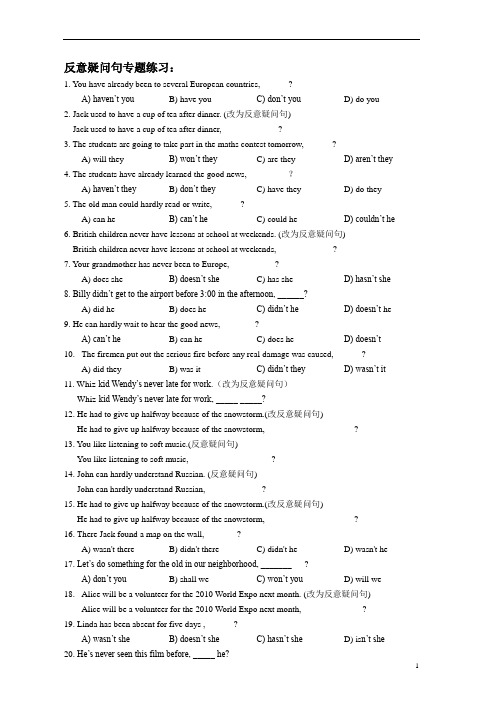
反意疑问句专题练习:1. You have already been to several European countries, ______?A) haven’t you B) have you C) don’t you D) do you2. Jack used to have a cup of tea after dinner. (改为反意疑问句)Jack used to have a cup of tea after dinner, ______ ______?3. The students are going to take part in the maths contest tomorrow, ______?A) will they B) won’t they C) are they D) aren’t they4. The students have already learned the good news, _________?A) haven’t they B) don’t they C) have they D) do they5. The old man could hardly read or write, ______?A) can he B) can’t he C) could he D) couldn’t he6. British children never have lessons at school at weekends. (改为反意疑问句)British children never have lessons at school at weekends, ______ ______?7. Your grandmother has never been to Europe, __________?A) does she B) doesn’t she C) has she D) hasn’t she8. Billy didn’t get to the airport before 3:00 in the afternoon, ______?A) did he B) does he C) didn’t he D) doesn’t he9. He can hardly wait to hear the good news, _______ ?A) can’t he B) can he C) does he D) doesn’t10. The firemen put out the serious fire before any real damage was caused, ______?A) did they B) was it C) didn’t they D) wasn’t it11. Whiz-kid Wendy’s never late for work.(改为反意疑问句)Whiz-kid Wendy’s never late for work, _____ _____?12. He had to give up halfway because of the snowstorm.(改反意疑问句)He had to give up halfway because of the snowstorm,___________ _________?13. You like listening to soft music.(反意疑问句)You like listening to soft music, _________ _________?14. John can hardly understand Russian. (反意疑问句)John can hardly understand Russian, ______ ______?15. He had to give up halfway because of the snowstorm.(改反意疑问句)He had to give up halfway because of the snowstorm,___________ _________?16. There Jack found a map on the wall, _______?A) wasn't there B) didn't there C) didn't he D) wasn't he17. Let’s do something for the old in our neighborhood, __________?A) don’t you B) shall we C) won’t you D) will we18. Alice will be a volunteer for the 2010 World Expo next month. (改为反意疑问句)Alice will be a volunteer for the 2010 World Expo next month, ?19. Linda has been absent for five days , ______?A) wasn’t she B) doesn’t she C) hasn’t she D) is n’t she20. He’s never seen this film before, _____ he?A) isn’t B) hasn’t C) is D) has21. There were few new types of cameras in this shop, ______?A) were there B) weren’t there C) were they D) weren’t they22. A large number of people a re keen on “planting online vegetables” these days, ________?A) don’t they B) do they C) aren’t they D) are they23. Th ere is no important information in today’s newspaper. (改为反意疑问句)There is no important information in today’s newspaper, _________ _________?24. Chemical factories mustn’t let out dirty water into rivers. (改为反意疑问句)Chemical factories mustn’t let ou t dirty water into rivers, ___________ ___________? 25. It hardly snows in Shanghai in winter. (改为反意疑问句)It hardly snows in Shanghai in winter, ___________ ___________?26. Peter seldom goes to work by bicycle on rainy days. (改为反意疑问句)Peter seldom goes to work by bicycle on rainy days, ___________ ___________ ?27. Many Americans have never been to China before. (改为反意疑问句)Many Americans have never been to China before, ___________ ___________?28. Finally Jack found the wallet for the old lady, ______?A) did she B) didn’t she C) didn’t he D) did he29. He ’s seldom late for school, ______ ______ ?A) hasn’t he B) isn’t he C)has he D) is he30. Let’s take a walk outside, _____ _____ ?A) don’t we B) will you C) shall we D) have we31. I don’t think he has to go, _____ _____ ?A) do I B) has he C) hasn’t he D) does he32.One of the first calculating machines was an abacus,Wasn’t it?33.We often have four lessons in the morning, don’t we ?34.Father will be back soon, won’t he?35.Tom failed in the exam, didn’t he?36.Let us sweep the floor, will he?37.It is unfair to do so, .i sn’t it?38.I don’t think there used to be a hospital,did there?39.Tom ’s finished it,hasn’t he?40.Few people can be live to be 120, can they?41.You seldom see him, do you?42.She hardly worked hard at school, did she ?43.What fine weather,isn’t it ?44.When we are in the library, we have to be quiet, don’t we?45.Nobody can answer me, can he/ she?46.She said nothing at the meeting, did she?。
反义疑问句知识点
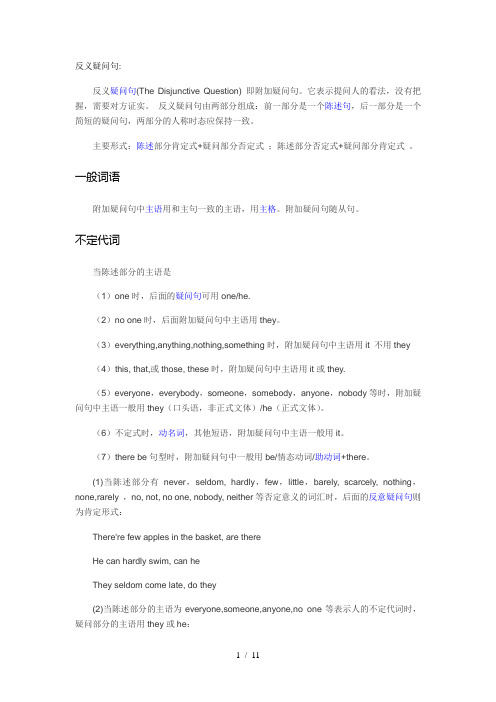
反义疑问句:反义疑问句(The Disjunctive Question) 即附加疑问句。
它表示提问人的看法,没有把握,需要对方证实。
反义疑问句由两部分组成:前一部分是一个陈述句,后一部分是一个简短的疑问句,两部分的人称时态应保持一致。
主要形式:陈述部分肯定式+疑问部分否定式;陈述部分否定式+疑问部分肯定式。
一般词语附加疑问句中主语用和主句一致的主语,用主格。
附加疑问句随从句。
不定代词当陈述部分的主语是(1)one时,后面的疑问句可用one/he.(2)no one时,后面附加疑问句中主语用they。
(3)everything,anything,nothing,something时,附加疑问句中主语用it 不用they(4)this, that,或those, these时,附加疑问句中主语用it或they.(5)everyone,everybody,someone,somebody,anyone,nobody等时,附加疑问句中主语一般用they(口头语,非正式文体)/he(正式文体)。
(6)不定式时,动名词,其他短语,附加疑问句中主语一般用it。
(7)there be句型时,附加疑问句中一般用be/情态动词/助动词+there。
(1)当陈述部分有never,seldom, hardly,few,little,barely, scarcely, nothing,none,rarely ,no, not, no one, nobody, neither等否定意义的词汇时,后面的反意疑问句则为肯定形式:There're few apples in the basket, are thereHe can hardly swim, can heThey seldom come late, do they(2)当陈述部分的主语为everyone,someone,anyone,no one等表示人的不定代词时,疑问部分的主语用they或he:Everyone in your family is a teacher, aren’t they\isn't he?(3)当陈述部分的主语为everything,something,anything.nothing等表示物的不定代词时,疑问部分的主语用it:Something is wrong with your watch, isn’t it(4)当陈述部分含有否定意思的词是unhappy,dislike,unfriendly,等含有否定词缀的派生词,也就是有un,dis,no-前缀、-less后缀等含有词缀而意思否定的词,当做肯定句处理,疑问部分要用否定形式。
反义疑问句(含答案)
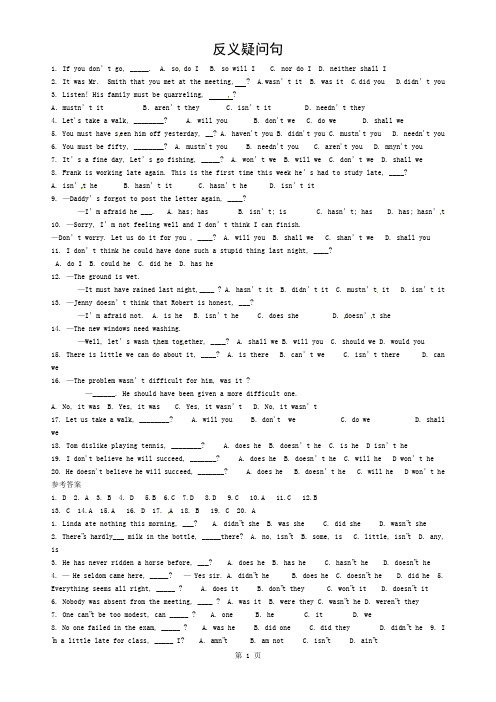
反义疑问句1. If you don’t go, _____. A. so do I B. so will I C. nor do I D. neither shall I2. It was Mr. Smith that you met at the meeting, ? A.wasn’t it B. was it C.did you D.didn’t you3. Listen! His family must be quarreling, ?A.mustn’t it B.aren’t they C.isn’t it D.needn’t they4. Let's take a walk, ________? A. will you B. don't we C. do we D. shall we5. You must have s een him off yesterday, __? A. haven't you B. didn't you C. mustn't you D. needn't you6. You must be fifty, ________? A. mustn't you B. needn't you C. aren't you D. mnyn't you7. It’s a fine day, Let’s go fishing, _____? A. won’t we B. will we C. don’t we D. shall we8. Frank is working late again. This is the first time this week he’s had t o study late, ____?A. isn’t heB. hasn’t itC. hasn’t heD. isn’t it9. —Daddy’s forgot to post the letter again, ____?—I’m afraid he ___. A. has; has B. isn’t; is C. hasn’t; has D. has; hasn’t 10. —Sorry, I’m not feeling well and I don’t think I can finish.—Don’t worry. Let us do it for you , ____? A. will you B. shall we C. shan’t we D. shall you11. I don’t think he could have done such a stupid thing last night, ____?A. do IB. could heC. did heD. has he12. —The ground is wet.—It must have rained last night,____ ? A. hasn’t it B. didn’t it C. mustn’t it D. isn’t it 13. —Jenny doesn’t think that Robert is honest, ___?—I’m afraid not. A. is he B. isn’t he C. does she D. doesn’t she14. —The new windows need washing.—Well, let’s wash t hem tog ether, ____? A. shall we B. will you C. should we D. would you15. There is little we can do about it, ____? A. is there B. can’t we C. isn’t there D. can we16. —The problem wasn’t difficult for him, was it ?—______. He should have been given a more difficult one.A. No, it wasB. Yes, it wasC. Yes, it wasn’tD. No, it wasn’t17. Let us take a walk, ________? A. will you B. don't we C. do we D. shall we18. Tom dislike playing tennis, ________? A. does he B. doesn’t he C. is he D isn’t he19. I don't believe he will succeed, _______? A. does he B. doesn’t he C. will he D won’t he20. He doesn't believe he will succeed, _______? A. does he B. doesn’t he C. will he D won’t he 参考答案1. D2. A3. B4. D5.B6.C7.D8.D9.C 10.A 11.C 12.B13. C 14.A 15.A 16. D 17. A 18. B 19. C 20. A1. Linda ate nothing this morning, ___? A. didn‟t she B. was she C. did she D. wasn‟t she2. There‟s hardly___ milk in the bottle, _____there? A. no, isn‟t B. some, is C. little, isn‟t D. any, is3. He has never ridden a horse before, ___? A. does he B. has he C. hasn‟t he D. doesn‟t he4. — He seldom came here, _____? — Yes sir. A. didn‟t he B. does he C. doesn‟t he D. did he5. Everything seems all right, _____ ? A. does it B. don‟t they C. won‟t it D. doesn‟t it6. Nobody was absent from the meeting, ____ ? A. was it B. were they C. wasn‟t he D. weren‟t they7. One can‟t be too modest, can _____ ? A. one B. he C. it D. we8. No one failed in the exam, _____ ? A. was he B. did one C. did they D. didn‟t he 9. I ‟m a little late for class, _____ I? A. amn‟t B. am not C. isn‟t D. ain‟t10. Neither you nor I am a artist, _____ ? A. am I B. aren‟t we C. are we D. ain‟t I11. He can‟t be her father, _____ he? A. is B. isn‟t C. can D. can‟t12. They have no time to visit the museum, __ ? A. do they B. haven‟t they C. don‟t they D. will they13. You have John do the work, _____? A. do you B. don‟t you C. haven‟t you D. have you14. You‟d better go at once, _____ you? A. hadn‟t B. did C. didn‟t D. don‟t 15. You ‟d rather work than play, _____ you? A. hadn‟t B. wouldn‟t C. didn‟t D. mustn‟t16. You dare not do that, _____ you? A. don‟t B. do C. dare D. daren‟t17. You must be tired, _____ you? A. mustn‟t B. needn‟t C. aren‟t D. can‟t18. He dislikes the two subjects, _____ he? A. does B. doesn‟t C. is D. isn‟t19. These tools are useless now, _____ ? A. are they B. aren‟t they C. is it D. isn‟t it20. He used to get up at 6:30, _____ he? A. didn‟t he B. did he C. used he D. wouldn‟t he21. I wish to go home early, _____ I? A. can B. must C. may D. do22. He ought to win the first prize, _______ he? A. mustn‟t B. oughtn‟t C. shouldn‟t D. Both B and C.23. Let‟s go there by bus, ___? A. will you B. shall we C. don‟t you D. will you24. Let us go to play football, ___? A. will you B. shall we C. do we D. are we25. Don‟t forget to give Polly some food and change her water,__?A. will youB.shall weC. won‟t youD. do you26. — Let‟s go shopping this afternoon, __? — All right. A. will we B. shall we C. don‟t we D. are we27. — Pass me the dictionary, ___ you? — Yes, with pleasure. A. would B. will C. won‟t D. wouldn‟t 28. — What beautiful weather, _____ ? — Yes, it is. A. is it B. isn‟t it C. am I right D. do you agree29. What kind people, _____ they? A. aren‟t B. are C. won‟t D. will30. There is little water in the glass, ____? A. isn‟t there B. isn‟t it C. is it D. is there31. — They don‟t seem to answer the phone. — There isn‟t anybody at home, _____?A. isn‟t thereB. is thereC. isn‟t itD. is it32. There won‟t be any concert this Saturday evening, ___ ?A. will there notB. will thereC. is thereD. won‟t33. — I guess she taught herself Japanese, ______? — Yes. A. don‟t I B. did she C. do I D. didn‟t she34. I don‟t believe you are right, _____ ? A. are you B. do you C. won‟t you D. do35. She doesn‟t think that Tom sings best in the class, __? A. does she B. doesn‟t she C. does he D. doesn‟t he 36. I told you that everybody couldn‟t do it well, _____ ? A. didn‟t I B. could they C. could he D. did I37. I know you didn‟t want to hurt me, _____ ? A. did you B. didn‟t you C. do I D. don‟t I38. If my father were here he would be very happy, __ ? A. weren‟t he B. were he C. wouldn‟t he D. would he 1—5 CDBDD 6—10 BACDC 11—15 AABAB 16—20 CCBBA 21—25CDBAA 26—30 BBBAD 31—35 BBDAA 36—38 AAC1. You’d rather watch TV this evening, ______?a. isn’t it b. hadn’t you c. wouldn’t you d. won’t you2. I suppose you’re not going today, ______? a. are you b. do you c. don’t you d. aren’t you3. I wish to shake hands with you, ______? a. shall b. may I c. do I d. will I4. Three hours ought to be enough time, ______?a. oughtn’t three hoursb. didn’t theyc. shouldn’t itd. shouldn’t three hours5. They have to study a lot, ______? a. don’t they b. haven’t they c. did they d. hadn’t they6. When the car crashed, your brother escaped being hurt, ______ ?a. didn’t heb. did hec. did itd. didn’t it7. I'm sure dirty, ______? a. am I b. isn’t I c. aren’t I d. am not I8. You seem to be dissatisfied with your present post. I don’t think you judged your ability objecti vely when you applied for it, ______ you? a. do b. did c. don’t d. didn’t9. That’s the sort of the book you want, ______? a. is it d. isn’t that c. is that d. isn’tit10. All these dictionaries are a great help to you, ______?a. are theyb. aren’t theyc. are all these dictionariesd. aren’t all these dictionaries11. The movie that we saw last week was quite interesting, ______?a. wasn’t itb. was itc. didn’t wed. weren’t we12. Tom has been writing letters all afternoon, but he should have finished them by now,______? a. hasn’t he b. has he c. shouldn’t he d. didn’t you13. David told me that you would take a trip to America, ______?a. would youb. woul dn’t youc. did youd. didn’t you14. There appeared to be no better way, ___? a. was there b. were therec. did thered. didn’t there15. You has some trouble finding where I live, ____? a. didn’t you b. hadn’t you c. doI d. don’t I16. He has his hair cut every month, ______? a. has he b. hasn’t he c. does he d. doesn’t he17. Your friend needs to come earlier, __? a. does he b. doesn’t he c. need he d. needn’t he18. The little boy dare not go to church, ___? a. dare he b. daren’t he c. does he d. doesn’t he19. Susan’d have worked abroad if she’d had the chance, ______?a. has sheb. hadn’t shec. would shed. wouldn’t she20. Everyone’s having a good time, ______? a. is he b. isn’t everyone c. does he d. aren’t they21. Any one can join the club, ______? a. can any one b. can’t any one c. can’t they d. can they22. Tell me how to operate the electronic computer, ___? a. will you b. shan’t you c. do you d. don’t you23. Magaret scarcely comes to visit you on Christmas Day, ______?a. doesn’t sheb. does shec. do youd. don’t you24. Let’s listen to the radio program that the teacher mentioned, ______?a. do web. don’t wec. shall wed. shan’t we25. You think you’re funny, ______? a. didn’t you b. are you c. don’t you d. do you26. Janet used to take part in labor in that village, ___? a. used she b. did she c. didn’t she d. should she27. What beautif ul weather, ______? a. is it b. isn’t it c. won’t it d. doesn’t it28. He ought to go to Kwangchow by plane, ______? a. should he b. shouldn’t he c. would he d. wouldn’t he29. We never dared to ask him a question, ______? a. did we b. didn’t we c. dared we d. daren’t we30. Nobody will believe how difficult his work has been ______?a. will heb. won’t nobodyc. will theyd. won’t they31. You must have made the mistake, __? a. mustn’t you b. haven’t you c. didn’t you d. hadn’t you32. Learning how to repair computers takes a long time, ______?a. isn’t itb. aren’t theyc. doesn’t itd. don’t they33. Jack has coffee with breakfast, ___? a. hasn’t Jack b. hasn’t he c. doesn’t Jack d. doesn’t he34. They must have stayed at hotel last night, ____?a. mustn’t theyb. haven’t theyc. didn’t theyd. hadn’t they35. There isn’t anything wrong with the radio, ______? a. is there b. is it c. does it d. does there36. You must be hungry, ______? a. must you b. mustn’t you c. are you d. aren’t you37. Let’s do the exercises by ourselves, ______? a. shall we b. shan’t we c. will you d. will we38. Her daughter had the carpets and curtains cleaned, ______?a. had sh eb. hadn’t shec. didn’t shed. didn’t her daughter39. The teacher had a talk with you, ______? a. has you b. hadn’t she c. did she d. didn’t she40. Something’ll have to be done about the air pollution, ______?a. won’t itb. will itc. has itd. does it1 C 19 D 37 A2 A 20 D 38 C3 B 21 C 39 D4 C 22 A 40 A5 A 23 B 41 6A 24 C 42 7 C 25 D 43 8B 26C 44 9D 27 B 45。
反义疑问句句
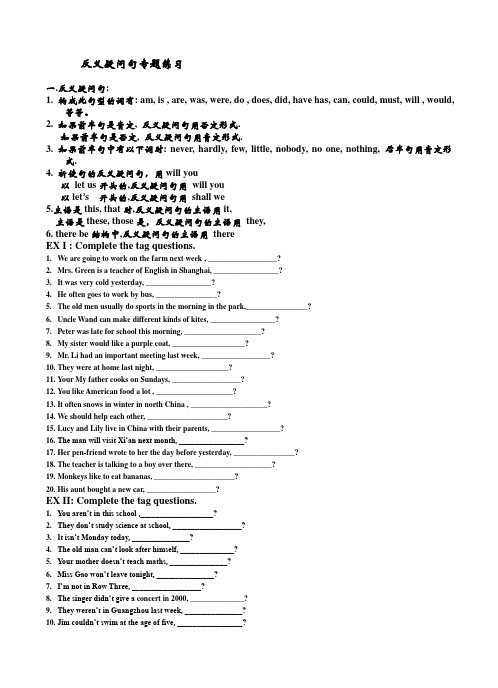
反义疑问句专题练习一.反义疑问句:1. 构成此句型的词有: am, is , are, was, were, do , does, did, have has, can, could, must, will , would,等等。
2. 如果前半句是肯定, 反义疑问句用否定形式.如果前半句是否定, 反义疑问句用肯定形式.3. 如果前半句中有以下词时: never, hardly, few, little, nobody, no one, nothing, 后半句用肯定形式.4. 祈使句的反义疑问句,用will you以let us开头的,反义疑问句用will you以let’s 开头的,反义疑问句用shall we5.主语是this, that时,反义疑问句的主语用it,主语是these, those是,反义疑问句的主语用they,6. there be结构中,反义疑问句的主语用thereEX I : Complete the tag questions.1.W e are going to work on the farm next week , __________________?2.Mrs. Green is a teacher of English in Shanghai, _________________?3.It was very cold yesterday, _________________?4.He often goes to work by bus, ________________?5.The old men usually do sports in the morning in the park,________________?6.Uncle W and can make different kinds of kites, _________________?7.Peter was late for school this morning, ____________________?8.My sister would like a purple coat, ___________________?9.Mr. Li had an important meeting last week, __________________?10.They were at home last night, ___________________?11.Y our My father cooks on Sundays, __________________?12.Y ou like American food a lot , ____________________?13.It often snows in winter in north China , ____________________?14.W e should help each other, _____________________?15.Lucy and Lily live in China with their parents, __________________?16.The man will visit Xi’an next month, _________________?17.Her pen-friend wrote to her the day before yesterday, ________________?18.The teacher is talking to a boy over there, ____________________?19.Monkeys like to eat bananas, _____________________?20.His aunt bought a new car, __________________?EX II: Complete the tag questions.1.Y ou aren’t in this school ,___________________?2.They don’t study science at school, __________________?3.I t isn’t Monday today, _______________?4.The old man can’t look after himself, ______________?5.Y our mother doesn’t teach maths, _______________?6.Miss Gao won’t leave tonight, _______________?7.I’m not in Row Three, __________________?8.The singer didn’t give a concert in 2000, ______________?9.They weren’t in Guangzhou last week, _______________?10.Jim couldn’t swim at the age of five, _________________?EX III: Complete the tag questions.1.That is an interesting film , _______________?e to the front, ________________?3.There is nothing in the box, ________________?4.Let’s go boating next week, __________________?5.These are apple trees, ___________________?6.Y ou never read his books, ________________?7.There was a concert in the theatre last night, _______________?8.Let us go to the farm together, _________________?9.The boy is no longer a waiter in the hotel , ________________?10.Please answer my questions, __________________?11.There was nobody in the house, ________________?12.His mother never goes to Tibet, _________________?13.This is very interesting, _________________?14.He found nobody around the farm, ___________________?15.Let’s go on a field trip, ________________?16.There are some children playing at the zoo, __________________?17.Mr. Y ang knew few Chinese when he was in USA, ______________?18.There was little meat in the fridge, ___________________?19.Let me have a look, ___________________?20.They had no time to do the work, ________________?。
(完整版)反义疑问句详细讲解及习题及答案
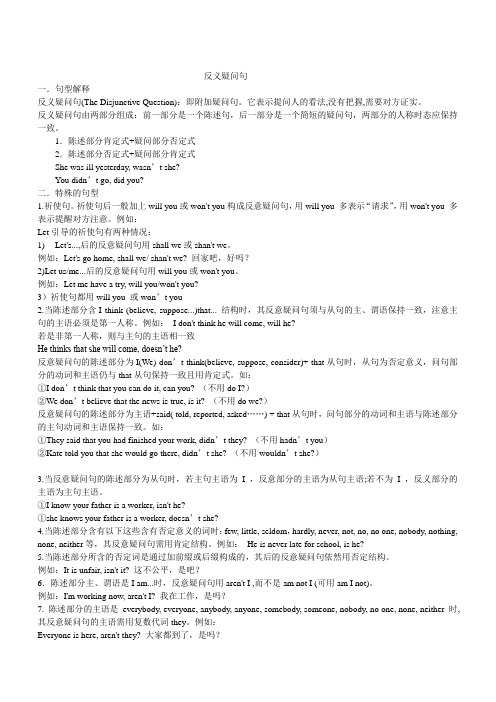
反义疑问句一.句型解释反义疑问句(The Disjunctive Question):即附加疑问句。
它表示提问人的看法,没有把握,需要对方证实。
反义疑问句由两部分组成:前一部分是一个陈述句,后一部分是一个简短的疑问句,两部分的人称时态应保持一致。
1.陈述部分肯定式+疑问部分否定式2.陈述部分否定式+疑问部分肯定式She was ill yesterday, wasn’t she?You didn’t go, did you?二.特殊的句型1.祈使句。
祈使句后一般加上will you或won't you构成反意疑问句,用will you 多表示“请求”,用won't you 多表示提醒对方注意。
例如:Let引导的祈使句有两种情况:1) Let's...,后的反意疑问句用shall we或shan't we。
例如:Let's go home, shall we/ shan't we? 回家吧,好吗?2)Let us/me...后的反意疑问句用will you或won't you。
例如:Let me have a try, will you/won't you?3)祈使句都用will you 或won’t you2.当陈述部分含I think (believe, suppose...)that... 结构时,其反意疑问句须与从句的主、谓语保持一致,注意主句的主语必须是第一人称。
例如:I don't think he will come, will he?若是非第一人称,则与主句的主语相一致He thinks that she will come, doesn’t he?反意疑问句的陈述部分为I(We) don’t think(believe, suppose, consider)+ that从句时,从句为否定意义,问句部分的动词和主语仍与that从句保持一致且用肯定式。
初中英语反意疑问句30题
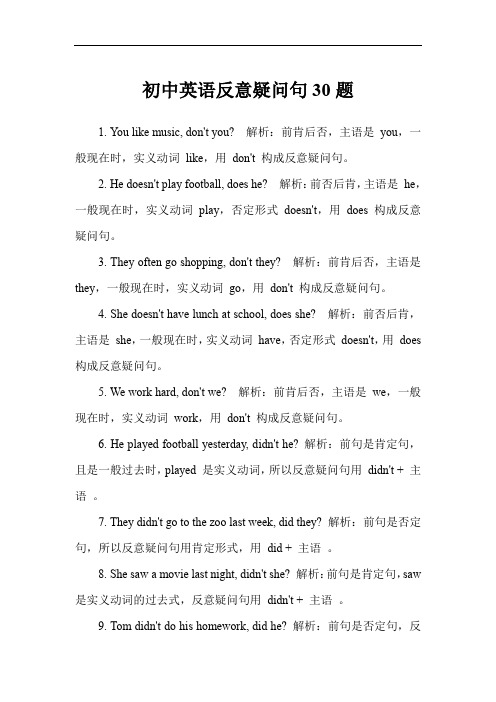
初中英语反意疑问句30题1. You like music, don't you? 解析:前肯后否,主语是you,一般现在时,实义动词like,用don't 构成反意疑问句。
2. He doesn't play football, does he? 解析:前否后肯,主语是he,一般现在时,实义动词play,否定形式doesn't,用does 构成反意疑问句。
3. They often go shopping, don't they? 解析:前肯后否,主语是they,一般现在时,实义动词go,用don't 构成反意疑问句。
4. She doesn't have lunch at school, does she? 解析:前否后肯,主语是she,一般现在时,实义动词have,否定形式doesn't,用does 构成反意疑问句。
5. We work hard, don't we? 解析:前肯后否,主语是we,一般现在时,实义动词work,用don't 构成反意疑问句。
6. He played football yesterday, didn't he? 解析:前句是肯定句,且是一般过去时,played 是实义动词,所以反意疑问句用didn't + 主语。
7. They didn't go to the zoo last week, did they? 解析:前句是否定句,所以反意疑问句用肯定形式,用did + 主语。
8. She saw a movie last night, didn't she? 解析:前句是肯定句,saw 是实义动词的过去式,反意疑问句用didn't + 主语。
9. Tom didn't do his homework, did he? 解析:前句是否定句,反意疑问句用肯定形式did + 主语。
(完整word版)小升初-反义疑问句

反义疑问句注意事项:不改变原句时态技巧总结:1. 先判断动词,根据句意确定是否需要加not;2. 再确定主语,用人称代词的主格形式代替主语部分写出下列句子的反意疑问句1、My father is a math teacher, ______________________?2、The children are playing football in the playground now, ________________________?3、We will have a sports meeting this weekend, ________________________?4、You should finish your homework now, ______________________________?5、I like swimming very much, _______________________?6、The little boy often does his homework at home on Sundays, __________________________?注意下面几组特殊情况前面出现带有“否定意义”的词语时:后面用肯定形式1.We never play outside at night, _______________________________?2.There is little bread on the table, ______________________________?3.The little boy has few friends in this new school, ___________________________?4.The little boy doesn’t like eating sweet food, __________________________________?指示代词和there be句型的特殊疑问句构成:切忌不可用代词it, they来代替there,It替代this, that they替代these, those1、There are a few students in the classroom, _______________________?2、This is a big library, ___________________________________?3、That is a big apple, _________________________________________?4、These are some red pencils, ____________________________________?5、Those are two pencil ---- boxes, ________________________________?当陈述部分是I think 加从句时,疑问句应和从句的人称时态保持一致I think chickens can swim, can’t they?I think Lucy is a good girl, isn’t she?I didn't think he was happy, was he?陈述句的主语是nobody,everyone,somebody等指人的不定代词时,反意疑问部分的主语多用they如果陈述句的主语是something,nothing,anything,everything等指物的不定代词时,反意疑问部分的主语多用itNobody says a word about the accident, do they?对这个事故没人说什么,是吗?Everything seems all right, doesn't it? 看起来一切顺利,是吗?陈述部分有had better 时,疑问句应用hadn’t开头You’d better get up early, hadn’t you?陈述部分有情态动词must,问句有2种情况mustn't表示“禁止,不可”时,附加问句通常要用must.You mustn't stop your car here,must you?你不能把车停在这地方,知道吗?must表示“有必要”时,附加问句通常要用needn't.They must finish the work today,needn't they? 他们今天要完成这工作,是吗?反义疑问句的回答用yes,no, 但是,当陈述部分是否定形式时,回答要按事实They don’t work hard, do they? 他们不太努力工作,是吗?---Yes, they do. 不,他们工作努力---No, they don’t.对,他们工作不努力单项选择1、My mother’s an English teacher, _____?A. is sheB. has sheC. isn’t sheD. hasn’t she2、She’s never spoken to a foreign(外国人), _________?A. is sheB. has sheC. isn’t sheD. hasn’t she句式转换:写出下列句子的反意疑问句1、He’s gone to Guangzhou, _______________?2、The little child’s from China, ___________________?A. can’t IB. won’t heC. doesn’t sheD. do youE. didn’t theyF. shouldn’t youG. isn’t sheH. are thereI. could sheJ. do theyK. don’t they将所给的反问句形式填入下面的句子中(只填序号)1、Quite a few people like this new student, __________?2、I can swim, __________________?3、My mother often cleans the house at the weekend, _______________?4、Tom will visit the museum this weekend, __________________?5、The boys played football on the playground yesterday afternoon, ___________?6、You should finish your homework now, _______________?7、Quite few people believe the little boy, _____________?8、You don’t like swimming, _____________?9、My mother is a teacher, _________________?10、There are few students in the classroom now, _______________?11、The little girl could hardly walk any farther, __________________?反意疑问句往年真题:(2013年广州大联盟真题)There isn’t a nice book on the table, ?A. isn’t itB. is itC. isn’t thereD. is there经典例题( )1、You were on the farm yesterday, ______ you?A. didn’tB. don’tC. can’tD. weren’t( )2、Don’t close the window, ______ you?A. didB. willC. wasD. won’t( )3、Let’s go shopping, ______ we?A. shallB. willC. wasD. is( )4、Joan’s late for school,______?A. wasn’t sheB. hasn’t sheC. isn’t sheD. doesn’t she综合练习1、There will be an exam soon, ____________?2、There are few people in the street, ________?A. aren’t thereB. are thereC. are theyD. aren’t they3、Linda went to the zoo three times last year ,__________?4、Tom is a worker, isn’t Tom?(找错)_______________5、He had lunch, doesn’t he?(找错)_______________6、They usually have a walk after supper,____________?7、They are pictures , _______________?8、There was a hospital here, _______________?9、She’s never been to Hong Kong, ___________?10、There is nothing important in the newspaper, ______________?11、Few people eat wild animals now, __________?12、He knows little German, ____________ ?13、You have seldom met him recently, ________?14、Let’s go home, ________________ ?15、Let us go home, ________________ ?16、Don’t open the door,________________ ?。
反义疑问句讲解及答案
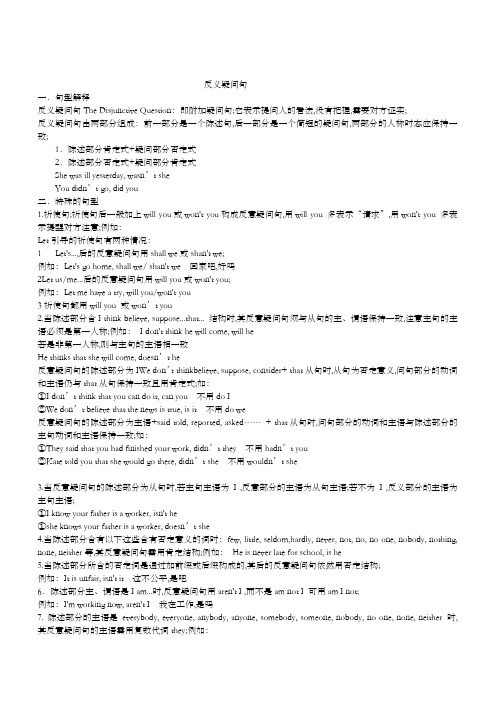
反义疑问句一.句型解释反义疑问句The Disjunctive Question:即附加疑问句;它表示提问人的看法,没有把握,需要对方证实;反义疑问句由两部分组成:前一部分是一个陈述句,后一部分是一个简短的疑问句,两部分的人称时态应保持一致;1.陈述部分肯定式+疑问部分否定式2.陈述部分否定式+疑问部分肯定式She was ill yesterday, wasn’t sheYou didn’t go, did you二.特殊的句型1.祈使句;祈使句后一般加上will you或won't you构成反意疑问句,用will you 多表示“请求”,用won't you 多表示提醒对方注意;例如:Let引导的祈使句有两种情况:1 Let's...,后的反意疑问句用shall we或shan't we;例如:Let's go home, shall we/ shan't we 回家吧,好吗2Let us/me...后的反意疑问句用will you或won't you;例如:Let me have a try, will you/won't you3祈使句都用will you 或won’t you2.当陈述部分含I think believe, suppose...that... 结构时,其反意疑问句须与从句的主、谓语保持一致,注意主句的主语必须是第一人称;例如:I don't think he will come, will he若是非第一人称,则与主句的主语相一致He thinks that she will come, doesn’t he反意疑问句的陈述部分为IWe don’t thinkbelieve, suppose, consider+ that从句时,从句为否定意义,问句部分的动词和主语仍与that从句保持一致且用肯定式;如:①I don’t think that you can do it, can you 不用do I②We don’t believe that the news is true, is it 不用do we反意疑问句的陈述部分为主语+said told, reported, asked……+ that从句时,问句部分的动词和主语与陈述部分的主句动词和主语保持一致;如:①They said that you had finished your work, didn’t they 不用hadn’t you②Kate told you that she would go there, didn’t she 不用wouldn’t she3.当反意疑问句的陈述部分为从句时,若主句主语为I ,反意部分的主语为从句主语;若不为I ,反义部分的主语为主句主语;①I know your father is a worker, isn't he①she knows your father is a worker, doesn’t she4.当陈述部分含有以下这些含有否定意义的词时:few, little, seldom,hardly, never, not, no, no one, nobody, nothing, none, neither等,其反意疑问句需用肯定结构;例如:He is never late for school, is he5.当陈述部分所含的否定词是通过加前缀或后缀构成的,其后的反意疑问句依然用否定结构;例如:It is unfair, isn't it 这不公平,是吧6.陈述部分主、谓语是I am...时,反意疑问句用aren't I ,而不是am not I 可用am I not;例如:I'm working now, aren't I 我在工作,是吗7. 陈述部分的主语是everybody, everyone, anybody, anyone, somebody, someone, nobody, no one, none, neither 时, 其反意疑问句的主语需用复数代词they;例如:Everyone is here, aren't they 大家都到了,是吗No one knows about it, do they 没有人知道这件事,对吗8.陈述部分的主语是everything, nothing, anything或something 时,反意疑问句的主语应用代词it;例如:Something is wrong with my radio, isn't it我的收音机出毛病了,是吧9.陈述部分的主语是指示代词this或that时,反意疑问句的主语用it,当陈述部分的主语是指示代词these或those 时,其反意疑问句的主语用they;例如:This is a plane, isn't it 这是一架飞机,是吗These are grapes,aren't they 这些是葡萄,是吗10.陈述部分的主语是不定代词one时,反意疑问句的主语可以用one,也可用you;例如:One should be ready to help others, shouldn't one每个人都应该乐于助人,是吧11. 当陈述部分谓语动词是need, dare,且这些词被用作实义动词时,其反意疑问句需用do的适当形式;例如:He needs help, doesn't he 他需要帮助,是吗12.当陈述部分主语是从句、不定式短语、动词-ing形式时,反意疑问句的主语应该用it;例如:What you need is more important, isn't it你需要的东西更重要,是吧12.havehas不是表示“有”的意思,并在句中做谓语时,其反意疑问句的助动词要用do, does, did;例如:They had a meeting just now,didn't they他们刚才开了个会,是吗15.陈述部分有have to 时,其反意疑问句要用助动词的否定形式;例如:You have to water the vegetables every day, don't youYou had to water the vegetables every day, didn't you16.He used to stay up late, usedn’t he/ didn’t he17.陈述部分是there be句型时,其反意疑问句中要用there;There was a hospital here, wasn't there18.陈述部分有had better时,反意疑问句中要用hadn't;例如:We’d better go to school at once, hadn't weHe’d rather go home, wouldn’t he19.当陈述部分含有情态动词must时,我们便要分析一下must的含义;如果must 作“一定;要;必须”讲,反意疑问句须用mustn't或needn't;而当must作推测意义“一定是;必定”讲时,反意疑问句则需根据must后的动词原形选用相应的形式;例如:He must work hard at physics, mustn't he他必须努力学物理,是吧Tom must be at home,isn't he 汤姆一定在家,是吧①He might have forgotten his pen in the classroom yesterday, didn’t he不用mightn’t he / hasn’t he②You must have got up late this morning, didn’t you 不用mustn’t you /haven’t you20.反意疑问句的回答用yes, no, 但是,回答意思相反,当陈述部分是否定形式时,回答要按事实;例如:They don’t work hard, do theyYes, they do. 不,他们工作努力;/No, they don’t. 对, 他们工作不努力;反意疑问句的陈述部分为I am……时,问句部分习惯上用aren’t I 表示;如:I am a very honest man, aren’t I反意疑问句练习1. I suppose the shoes will last you at least one year, ____________A. won’t theyB. will theyC. do ID. don’t2. Everyone is surprised at the news, _____________A, is he B. are they C. aren’t they D. is not he3. ----- You will come to have dinner with us, won’t you----- ____________A. Excuse me, I won’t.B. I haven’t been there.C. You are welcome.D. Yes. That’s very nice of you.4. Tom isn’t a hard-working student, for it is the third time he has been late, ______________A. wasn’t itB. hasn’t itC. isn’t itD. hasn’t he5. You don’t have to go school on Sundays, _____________ youA. haveB. doC. shouldD. would6. I don’t think he had his supper at the school, _____________A. had heB. did heC. do ID. don’t you7.I don’t think he’d like to take such a difficult job, __________A. had heB. would heC. do ID. don’t you8. I don’t think her passport’s gone, __________A. is itB. has sheC. do ID. don’t you9. Do pay attention to my work and keep your eyes open all the time, ____________A. will youB. don’t youC. shall weD. won’t we10. All the drivers dislike driving on the narrow roads ________________A. don’t theyB. don’t each of themC. do ID. don’t you11. Let’s go and have a walk,___________A. doB. shallC. haven’tD. shan’t12. Go and fetch a chair for him, ___________A. don’t youB. shall youC. won’t youD. will you13. There used to be a shop behind the factory, ________________A. didn’t thereB. used thereC. usedn’t it C. didn’t it14. I’m sure he must have been sleeping at the moment, __________A. aren’t I B, mustn’t C. wasn’t he D. hasn’t15. I had to tell the truth, __________A. hadn’t IB. wouldn’t IC. didn’t ID. shouldn’t I16.------- Why is Tom absent now-------He must be sick,________________A. isn’t heB. must heC. is heD. mustn’t he17, He’d like to have a look at your picture,_________-heA. hadn’tB. didn’t C .couldn’t D .wouldn’t18. You don’t think he will come,_________A. do youB. will youC. will heD. won’t he19. Let’s go home, shall we _________.A. That’s right.B. That’s allC. That’s all rightD. All right20. Jack had dinner with his mother at home yesterday,A. didB. doesC. didn’tD. hadn’t21. Let John finish the work all by himself,___________A. shall weB. will youC. do youD. do we22.I don’t think it is going to rain, _____________ itA. do IB. do youC. isD. isn’t23. Nothing the boy did was right, _______ itA. wasB. didC. wasn’t C. didn’t24. It’s the first time that she has been to the United States, ____________A. isn’t sheB. isn’t itC. hasn’t sheD. hasn’t it25. He was hardly able to stand on his feet after the car accident,__________ heA. couldB. couldn’tC. wasD. wasn’t26. Jack seldom goes to the park, _______________A. does heB. doesn’t heC. does JackD. doesn’t Jack27. People use tag question 反意疑问because they are not sure of what they have said _____________theyA. doB. didC. didn’tD. don’t28. Everyone wants to be chosen for the work, ____________A. isn’t heB. does heC. don’t theyD. do they29. She is going to see you ,_________ sheA. isn’tB. isC. don’tD. doesn’t30. They used to live in these mountain areas ,_____________ theyA. didB. didn’tC. usedD. weren’t31. He ought to go by plane, _____heA. shouldn’tB. wouldn’tC. shouldD. would32. Lovely weather ___________A. Yes. You are right.B. Yes ,isn’t itC. No, it isD. No, you are wrong33. ---------- You must do as I tell you.----------Oh, I must, ____________IA. shouldB. mustn’tC. oughtD. must34. We must start earlier,__________ weA. needn’tB. mustn’tC. don’tD. mustn’t35. You must have studied English for many years, _________ youA. didn’tB. haven’tC. needn’tD. mustn’t36. She must have arrived there yesterday, __________ sheA. didn’tB. hasn’tC. needn’tD. mustn’t37. We mustn’t be late, __________ weA. mustB. mayC. areD. A&B38, I needn’t show her the keys to the question, ________ IA. mustB. needC. canD. do39. We need to practice speaking English more often, ___________ weA. mustn’tB. needn’tC. can’tD. don’t40. I have to work this afternoon,__________ I A. don’t C, haven’t D. doKEY. 1--10 ACDCB BBAAA 11-20 BDACC ADADC21-30 BCABC ADCAB 31-40 ABDAB ADBDC。
史上最全最有方法的反义疑问句讲解及练习
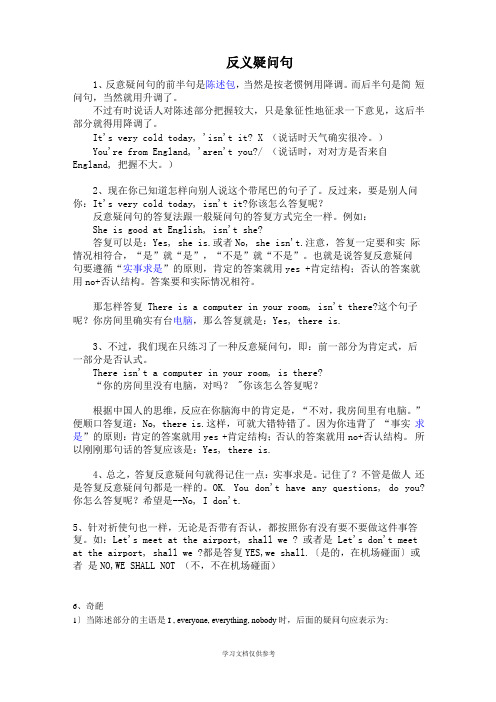
反义疑问句1、反意疑问句的前半句是陈述包,当然是按老惯例用降调。
而后半句是简短问句,当然就用升调了。
不过有时说话人对陈述部分把握较大,只是象征性地征求一下意见,这后半部分就得用降调了。
It's very cold today, 'isn't it? X (说话时天气确实很冷。
)You're from England, 'aren't you?/ (说话时,对对方是否来自England, 把握不大。
)2、现在你已知道怎样向别人说这个带尾巴的句子了。
反过来,要是别人问你:It's very cold today, isn't it?你该怎么答复呢?反意疑问句的答复法跟一般疑问句的答复方式完全一样。
例如:She is good at English, isn't she?答复可以是:Yes, she is.或者No, she isn't.注意,答复一定要和实际情况相符合,“是”就“是”,“不是”就“不是”。
也就是说答复反意疑问句要遵循“实事求是”的原则,肯定的答案就用yes +肯定结构;否认的答案就用no+否认结构。
答案要和实际情况相符。
那怎样答复 There is a computer in your room, isn't there?这个句子呢?你房间里确实有台电脑,那么答复就是:Yes, there is.3、不过,我们现在只练习了一种反意疑问句,即:前一部分为肯定式,后一部分是否认式。
There isn't a computer in your room, is there?“你的房间里没有电脑,对吗? "你该怎么答复呢?根据中国人的思维,反应在你脑海中的肯定是,“不对,我房间里有电脑。
” 便顺口答复道:No, there is.这样,可就大错特错了。
因为你违背了“事实求是”的原则:肯定的答案就用yes +肯定结构;否认的答案就用no+否认结构。
反义疑问句专题讲解

He hasn't a lot of time to spare , has he ? You don't have anything to say , do you ?
十二、带情态动词dare或need的反意疑问 句,疑问部分常用 need (dare ) +主语。
We need not do it again, need we ? He dare not say so, dare you ?
4) 如:作“想必”的意思时,附加部分根 据后面的部分结构来确定,不用mustn’t must be tired, aren’t you ? He must be at home, isn’t he ?
You
十一、
当陈述部分的动词用have
1) “吃饭,上课,开会”作谓语时,附加 部分用do 的形式。 He has four classes every morning, doesn't he ? You have only milk for breakfast, don't you?
may I ?
六、省去主语的祈使句的反意疑问句,疑 问部分用will you。 Don't do that again, will you Go with me, will you ? ?
注意:Let's 开头的祈使句,后用shall we? Let us 开头的祈使句,后用will you?
Let's go and listen to the music, shall we ? Let us wait for you in the reading-room, will you It is a fine day. Let’s go fishing, _______? shall we Let us do this job,_______? will you Turn on the radio,_______? will you
反义疑问句详解及练习题(带答案)

反义疑问句详解及练习题(带答案)反义疑问句的用法1.定义:反义疑问句,表示说话人提出看法、建议或意见,问对方同意与否。
2.结构:有两部分组成,前一部分为陈述形式,后一部分为疑问句。
3.形式:前肯后否与前否后肯。
XXX isn't beautiful, is she?露西不漂亮,是吗?Li Ming is pretty handsome, isn't he?XXX相当帅,不是吗?4.回答:肯定回答:“Yes+肯定结构”,否定回答“No+否定结构”,但是注意“Yes”要译为“不”,“No”要译为“是”。
-Your sister is a XXX, isn't she?你妹妹是老师,不是吗?-Yes, she is.不,她是老师。
-You can play the guitar, can't you?你会弹吉他,不是吗?-No, I can't.是的,我不会。
特别注意:1)当陈述部分为否定式,反意疑问句为肯定式时,其回答往往与汉语不一致"It isn’t cheap, is it?" "Yes, it is."“它不便宜吧?”“不,很便宜。
”"He doesn’t love her, does he?" "No, he doesn’t."“他不爱她,是吗?”“是的,他不爱她。
”此时,"Yes"即不,对前面"It XXX."的否定。
否认反意疑问句的回覆当陈述部分为肯定式,反意疑问句为否定式时,其回答一般不会造成困难,一般只需照情况回答即可:"It’s new, isn’t it?" "Yes, it is."“是新的,对吗?”“对,是新的。
”"He wants to go, doesn’t he?" "No, he doesn’t."“他想去,对吗?”“不,他不想去。
反义疑问句(含解析、例句及详尽用法)

反义疑问句【2 】一、祈使句的反义疑问句1、确定祈使句Will you?/won’t you?2、否认祈使句Will you?3、Let的祈使句Let us ...,will you?(此处Let us 表示“许可我们...”)Let’s...,shall we? (此处Let’s表示“让我们...吧”)Let + 第三人称...,will you?二、Must的反义疑问句1、表示“必须” musn’t /needn’tEg. You must go now, needn’t you?2、表示“不准”Eg. You musn’t smoke here, must/may you?3、表示推想,确定.(I’m sure + 从句)Eg. You must be hungry now, aren’t you?I’m sure you are hungry now, aren’t you?She must have heard about that, hasn’t she?I’m sure you have heard about that, haven’t you?You must have watched that movie last night, didn’t you?(last nigh为具体时光点,所以用一般曩昔式)三、主语(反义疑问句)+从句主句:I(don’t)think/believe/consider/suppose 或I’m afraid/sure...后扈从句时,可将从句部分进行反义疑问Eg. I don’t think he will win, will he?I think he will win, won’t he?She thinks he will win, doesn’t she?(当主句主语不是I时不实用于该用法,此句中的翻译疑问针对的是主句而非从句)四、当句中包含有表示否认意义的副词或不定代词时,反义疑问句用确定情势Eg. Nothing happened to him, did it?It is unfair, isn’t it?He dislikes watching TV, doesn’t he?(该句中含否认意义的是动词而非副词或不定代词,是以不实用于该用法,反义疑问句仍然应用否认情势)五、反义疑问句的答复反义疑问句的答复针对被提问部分的谓语动词,且与答复句前部分的Yes和No 保持一致Eg. A: You haven’t lost the ticket, have you?B: D I know it’s hard to get another one at this moment.A. Yes, I haven’tB. No, I haveC. I hope soD. I’m afraid not六、陈述部分的主语与反义疑问句主语保持一致的情形1、OneEg. One can’t be too careful when driving a car, can one/he?一小我在开车的时刻再怎么当心也不为过.2、This/that/these/those/it/theyEg. This is true, isn’t it?3、Something/nothing/anything/everything,反问句顶用itEg. Nothing happened to him, did it?4、当陈述部分主语为everybody/everyone/anyone/anybody/nobody/noone等不定代词时,反义疑问句顶用he.theyEg. Nobody wants to be laughed at,does he?/Do they?5、当陈述句主语为不定式,句子,动名词,反问句顶用itEg. Learning English takes a lot of time, doesn’t it?。
反义疑问句专题训练

反义疑问句专题训练反意疑问句由两部分构成:前一部分是陈述句,后一部分是一个简短的疑问句,前后两部分在时态、人称和数上都要保持一致。
1.肯定式陈述部分+否定式疑问部分He looks like his father, doesn' t he ?他长的像他爸爸,不是吗?She was ill yesterday, wasn ' t she ?她昨天病了,不是吗?2.否定式陈述部分+肯定式疑问部分He doesn' t need to work so late , does he?他不需要工作到那么晚,对吗?He can' t ride a bike , can he?他不会骑自行,是吗?规则1.前肯后否,前否后肯。
2.表示否定的词hardly, seldom, little, few等3.解题技巧回答部分:看后面,根据事实回答,符合事实回答用yes,不符合用no。
例1:Your brother’s never careless, ______ he?--__________, he often makes mistakes.A. has, YesB. has, NoC. is, YesD. is, No解析:前半句“Your brother’s never careless”是否定句,故反义部分“______ he”用肯定。
答句:“he often makes mistakes.”表明他确实粗心,故答句用Yes, my brother is careless.答案:C中考复习反义疑问句专项练习1.--- They have never seen the film, they?--- Yes, they have.A. haveB. haven’tC. doD. don’t2.There’s little important news in the newspaper today, ______?A. isn’t thereB. is thereC. is itD. are there3.I don’t think the newly-directed film by Zhaowei is as interesting as people say, _______?A. do youB. isn’t itC. is itD. don’t you 4.-----You are going to visit the Great Wall,_____?-----That’s right.A. are youB. aren’t youC. don’t you5.---You never have sweet snacks, do you?---________. Though I know they’re bad for our health.A. YesB. NoC. Yes, I don’tD. No, I do6.You went to the concert yesterday, ____ ?A. do youB. don’t youC. did youD. didn’t you 7.—There is little water left in the bottle, ______?—No, we need to buy some more before we run out of it.A. is thereB. isn’t thereC. is itD. isn’t it 8.——You aren’t a stranger, are you?——, don’t you remember me at the school gate ten minutes ago?A. Yes, to seeB. No, seeingC. No, sawD. Yes, seeing9.You can hardly see anything in the dark room, _____?A. can’tB. can youC. can’t weD. can we参考答案1-9A B C B A D A B1.A【解析】试题分析: 反义疑问句一般遵循前肯定则后否定,前否定则后肯定,疑问部分时态,人称要与前文保持一致。
高中英语语法:反义疑问句专项讲解(含答案)
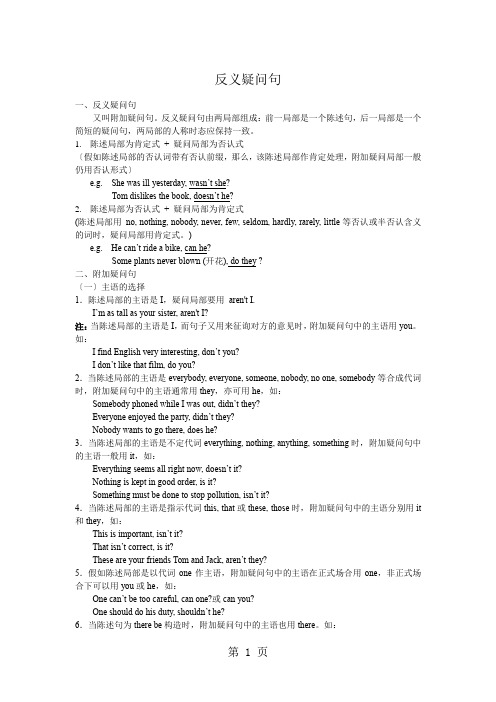
反义疑问句一、反义疑问句又叫附加疑问句。
反义疑问句由两局部组成:前一局部是一个陈述句,后一局部是一个简短的疑问句,两局部的人称时态应保持一致。
1.陈述局部为肯定式+ 疑问局部为否认式〔假如陈述局部的否认词带有否认前缀,那么,该陈述局部作肯定处理,附加疑问局部一般仍用否认形式〕e.g. She was ill yesterday, wasn’t she?Tom dislikes the book, doesn’t he?2.陈述局部为否认式+ 疑问局部为肯定式(陈述局部用no, nothing, nobody, never, few, seldom, hardly, rarely, little等否认或半否认含义的词时,疑问局部用肯定式。
)e.g. He can’t ride a bike, can he?Some plants never blown (开花), do they ?二、附加疑问句〔一〕主语的选择1.陈述局部的主语是I,疑问局部要用aren't I.I’m as tall as your sister, aren't I?注:当陈述局部的主语是I,而句子又用来征询对方的意见时,附加疑问句中的主语用you。
如:I find English very interesting, don’t you?I don’t like that film, do you?2.当陈述局部的主语是everybody, everyone, someone, nobody, no one, somebody等合成代词时,附加疑问句中的主语通常用they,亦可用he,如:Somebody phoned while I was out, didn’t they?Everyone enjoyed the party, didn’t they?Nobody wants to go there, does he?3.当陈述局部的主语是不定代词everything, nothing, anything, something时,附加疑问句中的主语一般用it,如:Everything seems all right now, doesn’t it?Nothing is kept in good order, is it?Something must be done to stop pollution, isn’t it?4.当陈述局部的主语是指示代词this, that或these, those时,附加疑问句中的主语分别用it 和they,如:This is important, isn’t it?That isn’t correct, is it?These are your friends Tom and Jack, aren’t they?5.假如陈述局部是以代词one作主语,附加疑问句中的主语在正式场合用one,非正式场合下可以用you或he,如:One can’t be too careful, can one?或can you?One should do his duty, shouldn’t he?6.当陈述句为there be构造时,附加疑问句中的主语也用there。
反义疑问句经典例题

反义疑问句经典例题一、基础概念回顾反义疑问句由两部分组成:前一部分是一个陈述句,后一部分是一个简短的疑问句,两部分的人称时态应保持一致。
1. 基本原则- 前肯后否,前否后肯。
- 回答时,事实是肯定就用yes,事实是否定就用no,但是要注意翻译时yes 和no的含义与汉语习惯相反。
二、经典例题及解析例题1:He is a student, isn't he?- 解析:这是一个典型的前肯后否的反义疑问句。
陈述句部分“He is a student”是肯定句,所以简短疑问句部分为“isn't he”。
如果他确实是学生,回答就是“Yes, he is.”(是的,他是。
);如果他不是学生,回答就是“No, heisn't.”(不,他不是。
)。
例题2:She doesn't like apples, does she?- 解析:这里是前否后肯的情况。
陈述句“She doesn't like apples”是否定句,所以简短疑问句为“does she”。
如果她确实不喜欢苹果,回答是“Yes, she doesn't.”(是的,她不喜欢。
);如果她喜欢苹果,回答是“No, she does.”(不,她喜欢。
)。
例题3:They have been to Beijing, haven't they?- 解析:前肯后否,陈述句部分“They have been to Beijing”是肯定句,简短疑问句部分“haven't they”。
如果他们确实去过北京,回答“ Yes, theyhave.”(是的,他们去过。
);如果没去过,回答“No, they haven't.”(不,他们没去过。
)。
例题4:There is little water in the glass, is there?- 解析:注意“little”表示否定意义“几乎没有”,所以这是一个前否后肯的句子。
- 1、下载文档前请自行甄别文档内容的完整性,平台不提供额外的编辑、内容补充、找答案等附加服务。
- 2、"仅部分预览"的文档,不可在线预览部分如存在完整性等问题,可反馈申请退款(可完整预览的文档不适用该条件!)。
- 3、如文档侵犯您的权益,请联系客服反馈,我们会尽快为您处理(人工客服工作时间:9:00-18:30)。
反意疑问句专题一、基本用法与结构反意疑问句由“陈述句+简略疑问句”两部分组成,第一部分提出一种看法,第二部分用来质疑或表示证实。
陈述部分与疑问部分的动词时态和动词性质应保持一致,而且肯定和否定形式彼此相反,即陈述部分为肯定式时,疑问部分用否定式,陈述部分为否定式时,疑问部分用肯定式:He likes English, doesn’t he? 他喜欢英语,是吗?He doesn’t like English, does he? 他不喜欢英语,是吗?【注】1. 若陈述部分含有hardly, never, few, nothing ,little,nobody,seldom等否定词或半否定词,其疑问部分要用肯定式:He has few friends here, has he? 他在这儿几乎没什么朋友,是吗?She said nothing, did she? 她什么也没说,是不是?2. 若陈述部分含有带否定前缀的词,疑问部分仍用否定式:It is unfair, isn’t it? 这不公平,不是吗?It is impossible, isn’t it? 那是不可能的,是吗?3. 当陈述部分为为there be句型时,疑问部分仍用there作“主语”:There was nothing in the room, was there? 房间里什么也没有,是吗?4. 当陈述部分的主语是指示代词(this ,that ,these ,those)时,疑问部分用it, they等代词:That is a new car, isn’t it? 这是一辆新汽车,是吗?5.当陈述部分的主语是复合不定代词时,若陈述部分的主语为somebody, someone, everyone, everybody, no one, nobody等复合不定代词,其反意疑问句的主语在正式文体中用he,在口语或非正式文体中通常用they:Nobody was late, were they? 没有一个人迟到,是吗?6.当陈述部分的主语是something, anything, nothing, everything等复合不定代词时,其反意疑问句的主语要用it:Everything is ready, isn’t it? 一切都准备好了吗?Nothing is important, is it? 没有什么重要的,不是吗?二、含情态动词的反意疑问句1. 基本原则:在通常情况下,当陈述部分含有情态动词时,疑问部分会重复前面同样的情态动词:He can speak English, can’t he?他会说英语,是吗?We shouldn’t go, should we? 我们不应该去,对不对?2. 当陈述部分含有must时,要分两种情况:①若must表示“必须”或“有必要”,疑问部分用mustn’t 或needn’t:You must leave at once, mustn’t [needn’t] you? 你必须(有必要)马上离开,是吗? 但是若陈述部分有mustn’t表示禁止,疑问部分要must:You mustn’t laugh, must you? 你不准笑,知道吗?②若must表示推测,疑问部分不能用must,而应根据must后的动词结构采用相应的动词形式:He must be tired, isn’t he? 他一定累了,是吗?三、陈述部分为祈使句的反意疑问句1. 基本原则:若陈述部分为祈使句,疑问部分通常用will you:Please help us, will you? 请帮帮我们,好吗?Come with us, will you? 同我们一起去,好吗?Don’t forget to post the letter, will you? 请别忘了寄信。
2. 当祈使句为Let’s…时,疑问部分总是用shall we:Let’s go there together, shall we? 我们一起去,好吗?3. 当祈使句为Let us…时,若表示请求,疑问部分用will you,若表示建议,疑问部分用shall we:Let us know your address, will you? 请把你的地址告诉我们,好吗?Let us go swimming together, shall we? 我们一起去游泳好吗?四、陈述部分为主从复合句的反意疑问句1. 当陈述部分为主从复合句时,疑问部分一般应与主句保持一致:She said that he didn’t like it, didn’t she? 她说他不喜欢它,是不是?He knows where I live, doesn’t he? 他知道我住什么地方,是不是?当陈述部分为I think (believe, suppose) that...等时,疑问部分通常与从句保持一致(注意否定的转移):I think that it is too short, isn’t it? 我认为它太短了,对不对(它太短吗)?I don’t think he will come, will he? 我认为他不会来,对吗(他会来吗)?【注】这类用法主要限于主语为第一人称且think等动词为一般现在时的情形。
五、几种特殊情况的反意疑问句1. 当陈述部分是I’m…时,疑问部分通常用aren’t I:I’m wrong, aren’t I? 我错了,是吗?I’m older than you, aren’t I? 我年纪比你大,对不对?2. 当陈述部分是I wish…时,疑问部分通常用may II wish to go with them, may I? 我想同他们一起去,可以吗?3. 当陈述部分有had better时,疑问部分用had:He’d better leave here, hadn’t he? 他最好离开这儿,是吗?Would better ,疑问部分would()1. Don’t forget to give Polly some food and change her water, _______? A. shall we B. will you C. won’t you D. do you()2. There is little juice in the glass, _________?A. is thereB. isn’t thereC. is it()3. ---He’s seldom late for school, ___________?---No. He is used to going to school early.A. isn’t heB. has heC. hasn’t heD. is he()4.---This bus is always late, _________?---Sure, it is.A. is not itB. isn’t itC. isn’t the busD. doesn’t it ()5.---You’re new here, ________?----Yes, I’m from Dujiangyan. I came here last week.A. do youB. don’t youC. are youD. aren’t you ()6. You used to be outgoing, ?A. do youB. don’t youC. didn’t youD. did you ()7. He has never watched such an important match , _____ he?A. hasn'tB. hasC. isD. isn't()8.They have to work at once,______ they?A. haveB. haven'tC. doD. don't()9. She often feels tired,______ she?A. doesn'tB. doesC. isD. isn't()10. Let's take a short rest, ______?A. do weB. aren't weC. will youD. shall we()11. Hundreds of people lost their lives in the accident,_______ they?A. don'tB. didn'tC. doD. did()12. ---Lily didn't come to school, did she?---____. She was ill in bed.A. No, she didB. Yes, she did.C. No, she didn't.D. Yes, she didn't()13.---She isn't a teacher, is she?---_____. She works in a hospital.A. No, she isB. Yes, she is.C. No, she isn't.D. Yes, she isn't()14.Lily looks like Lucy,_______?A. is LilyB. isn't sheC. does LillyD. doesn't she()15.Tom often has lunch at school,_____?A. doesn't TomB. doesn't heC. does TomD. doesn't he课后练习()1.He hardly hurt himself in the accident___________?A. doesn’t heB. didn’t heC. did heD. does he()2. Let’s search the Internet for some information about famous people,______?A. will youB. won’t youC. shall we()3.Eric’s never seen a three-D movie at the cinema,_______?A.hasn’t he B.has he C.isn’t he D.is he ()4.---He didn’t go to the lecture this morning, did he?----______. Though he was not feeling very well.A. No, he didn’t.B. Yes, he did.C. No, he did.D. Yes, he didn’t.()5.—He’s already back to Australia, _________?— _________. He is on a visit to Shanghai.A. isn’t he; NoB. hasn’t he; YesC. isn’t he; YesD. hasn’t he; N()6.—She doesn’t like geography,does she?—___________ .A. Yes,she doesB. Yes,she doesn’tC. No,she does ()7. He’s flown to Hainan for a holiday, _______ he?A. isn’tB. hasn’tC. wasn’t()8. ---- Let’s go skating,_______? ---- OK. Let’s go.A. do youB. don’t youC. wi ll youD. shall we()9. ---There is little milk in the milk bag, ________ there?---OK. I’ll get you a new bag.A. isB. isn’tC. aren’tD. are()10. Bob, you watched the fashion show last night, ________?A. w eren’t youB. didn’t youC. haven’t youD. won’t you()11. I don’t think she has gone to Beijing, _______?A. has sheB. hasn’t sheC. do ID. don’t I()12. There is no important information in the newspaper, _______?A. isn’t thereB. is itC. is there()13. There are two libraries in this city, _______?A. aren’t thereB. aren’t theyC. are two()14. Mom, my grandfather goes for a walk after supper every day, _______? A. does h e B. is he C. doesn’t he D. isn’t he()15. Liu Qian has made “magic”a hot word, _______ he?A. doesn’tB. didn’tC. hasn’tD. isn’t()16.---You aren’t a professional athlete, are you?---______. I am just a football fan.A. Yes, I amB. No, I’m notC. Of courseD. Sometimes。
